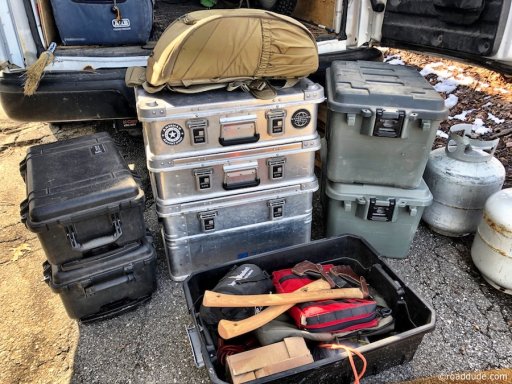.
I try to practice what I call
THBP in wilderness awareness.
Types, Habits, Best Practices.
I like camping solo as remote as roads and rig will let me, and I love learning as much as I can about where I am, from fauna and flora to local geology and history.
It fits hand in hand to learn:
- what
types of bears (or other potentially dangerous critters and plants) are likely to be where I'm camping
- what their
habits are, and
- what my
best practices should be when in their country.
My advice In storing and cooking food in active bear country, is when possible employ what folks call a Bear Triangle, with Sleeping, Food Storage, and Kitchen at points of a triangle
at least 25 paces (approx 100') apart.
Sleeping area should be upwind from cooking and food storage, meaning set up so prevailing breeze/wind comes from behind your sleeping area >>towards>> food storage and cooking areas. That's so a bear who's caught scent of your food or cooking area is likely to have come come from a downwind direction and will find those areas before it stumbles across your sleeping area.
These days it is harder to find good camp spots where you can use a large Bear Triangle, though when you can, it's a best practice.
For best practice in storing food, my first line of defense is certified bear-resistant containers. Yep, that's a real thing. I have three
Zarges K470 cases that are certified bear resistant by the IGBC;
Interagency Grizzly Bear Committee (see vid below). Besides being rugged, lockable cases, they have a durable, effective, and waterproof seal that prevents food smells from escaping when closed.
They're expensive, though if you camp a lot in bear country, or just get out adventuring a lot in general, these cases (middle stack in image below) are well worth it. My K470s will still be around and used by my kid and her kid long after I'm gone, with each scratch, ding, and sticker telling a story.
View attachment 198746
I've camped in bear country where Rangers and Game Wardens will impose a fine for leaving a cooler or food boxes out, but have nodded at mine and said "Good man; you know what to use."
Here's the whole
Zarges K470 list. The three with double asterisks ** are certified Grizzly bear-resistant.
Here's the list of
IGBC Certified Bear-Resistant Products.
Bear Bags: I've gotten away from hanging food in a bag from tree limbs. A lot of times where I camp there aren't any trees around. Other times I've woken up to find my bread and other perishables scattered around the ground, after being hauled up by racoons and torn open. Black Bears can, and will, climb trees, too, and are known to even sleep in trees.
Food smells: Clean your food prep pans and dishes, utensils, etc thoroughly. Ziplock and lock away any towels, skillet leathers, etc that were used in food prep, as well as any paper, wrappings, etc if you can't burn it. If you can have a fire, be diligent about cleanliness of cooking grease and not leaving charred bits of food in or around firepits or grills.
I know a through hiker on the AT who was very bear-aware and thorough about cleaning up after cooking, though had absentmindedly wiped his hands on his trousers when making a sausage meal. He woke up in the middle of the night to the head of a black bear poking into his backpacking tent.
Bear habits: Learn about the type of bear where you'll be camping; when they forage, what foods they like, nocturnal habits, etc. I can't vouch for Brown, Kodiak, or Grizzlies, but Black Bears have lousy eyesight, so they don't often come out at night much unless it's near full moon and clear. Here's a good page on
Black Bear Facts. Search around and I'll bet you'll find more on Grizzlies, Brown Bears, etc.
I've camped a lot in the mountains of East Tennessee and the Chihuahuan Desert, both of which have black bear varities. I've had several bear encounters over the years. On one windy full-moon night in a new spot, I was watching the treetops dance overhead. It was like a giant ballet of seaweed in ocean currents; a noisy overhead whoosh swaying back and forth with great grace.
I looked down to see a shadow big as a boulder move at the edge of camp. My eyes adjusted, and about 30' away was a large black bear, snout up to the dark air, sniffing and stepping towards me. I slid my hand to my belt, got my flashlight, flicked it on, and made myself big as I could with arms out, all hunched. I shone the light on him and growled "Youuuu better get on OOOUT of here!"
He took another two steps towards me, intent on finding the source of whatever he'd smelled, then turned. He kept looking back over his shoulder at me. I kept my light on him and followed. He crossed the path and stood up behind a large tree. He grabbed around its sides. I thought he was going to climb, though he kept leaning to poke his head around to see if I was still coming. Was kind of comical, really.
I saw the next morning that the last campers to use my site had left food bits charred on the fire-ring grill. Full moon nights in the mountains can bring bear out for just that sort of thing.
A lot of bear-awareness is just using common sense. Read up a bit about it where you're going, especially from experienced hikers in bear country; they'll have good tips on how to be best prepared.
IGBC Certification Test with Zarges K470s and Grizzlies:
.
There exists a veritable plethora of info on camping around bears. More on using the "Bear-muda Triangle" for spacing between cooking, sleeping, and food storage; bear bags, and more can be found with a simple search:
Bear Triangle
.










